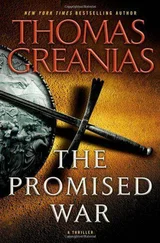Thomas Greanias - The 34th Degree
Здесь есть возможность читать онлайн «Thomas Greanias - The 34th Degree» весь текст электронной книги совершенно бесплатно (целиком полную версию без сокращений). В некоторых случаях можно слушать аудио, скачать через торрент в формате fb2 и присутствует краткое содержание. Жанр: Триллер, на английском языке. Описание произведения, (предисловие) а так же отзывы посетителей доступны на портале библиотеки ЛибКат.
- Название:The 34th Degree
- Автор:
- Жанр:
- Год:неизвестен
- ISBN:нет данных
- Рейтинг книги:3 / 5. Голосов: 1
-
Избранное:Добавить в избранное
- Отзывы:
-
Ваша оценка:
- 60
- 1
- 2
- 3
- 4
- 5
The 34th Degree: краткое содержание, описание и аннотация
Предлагаем к чтению аннотацию, описание, краткое содержание или предисловие (зависит от того, что написал сам автор книги «The 34th Degree»). Если вы не нашли необходимую информацию о книге — напишите в комментариях, мы постараемся отыскать её.
The 34th Degree — читать онлайн бесплатно полную книгу (весь текст) целиком
Ниже представлен текст книги, разбитый по страницам. Система сохранения места последней прочитанной страницы, позволяет с удобством читать онлайн бесплатно книгу «The 34th Degree», без необходимости каждый раз заново искать на чём Вы остановились. Поставьте закладку, и сможете в любой момент перейти на страницу, на которой закончили чтение.
Интервал:
Закладка:
They were approaching Constitution Square. There was the old, aristocratic Hotel Grande Bretagne, host to so many of his childhood dances with Aphrodite. Now it was the headquarters for the German authorities. To their right was the Parliament building, useless since 1936, when Metaxas dissolved Parliament after the king had given him free rein. Andros remembered the furor surrounding the military crackdown. At least those were Greek troops in the city then. Now there were Axis sentries posted against the building’s yellow walls and Axis tanks parked on its ramparts.
“I need not remind you, Herr Andros,” Werner continued, “that the Germans helped Greece in her war of independence more than the British. What is now the Parliament was the original palace of Greece’s first king, Otto, brother of King Ludwig of Bavaria.”
What Werner failed to mention, thought Andros with a smile, was that the Greeks of Otto’s day had kicked the seventeen-year-old monarch out.
Werner sighed. “If only King Otto’s architects from Munich had proceeded with their plans for wide, straight thoroughfares, this could have been a great modern city. But the Greeks of his day complained they would bake on those boulevards without shade, and the shopkeepers would lose business on their little streets. As it is, the city is nothing but a labyrinth of twisting alleys and slums.”
“Must make it difficult for you to track anybody down,” Andros mused. “And so much easier to hide.”
Werner had opened his mouth to reply when shouts came from the university. Andros looked out the window to his left and saw a motorized Axis column, four abreast, charging down University Street. He turned to Werner, who looked ahead stiffly.
“Unfortunately, Herr Andros, Communist-inspired elements remain unfriendly to the New Order and have yet to embrace the great ideals of national socialism. They disguise themselves as student demonstrators and insist on inciting riots and disturbing the public. The Italian carabinieri often must disperse them with bullets.”
“Good riddance,” said Andros, deciding now was the time to play the snob. “But don’t such actions put a damper on the social life here?”
“Not at all,” Werner replied, visibly pleased with the turn in his guest’s attitude. “Baron von Berg sees to that.”
“Baron von Berg,” repeated Andros. “Yes, you must tell me more about him. All they told me in Bern was that he is some sort of liaison to Swiss industry for Germany.”
“Not just a liaison but a great German industrialist. And a friend of the Greek people, a true philhellene.”
“Is that so?”
“Oh, yes. His family has enjoyed a long friendship with the Greek people. I know his grandfather funded quite a few archaeological excavations on Crete. These days the Baron sponsors music festivals at the Euripides Theater and a number of charity events.”
“How generous of him.”
“The proceeds, you may be interested to know, go to Red Cross efforts to help villages terrorized by the Communists in the mountains.”
“I can’t wait to meet the gentleman.”
“Indeed. Tonight he’s throwing a little party and requests the honor of your presence.” Werner handed Andros a formal invitation signed by Baron Ludwig von Berg.
“I recognize this address.” Andros showed his anger when he looked up at the smiling Werner. “This is the Vasilis estate.”
“Why, yes, the Vasilis family ran into financial troubles with the war. The Baron, recognizing the architectural value of their estate, is leasing it from them temporarily and overseeing its restoration. The family still lives there.”
“How kind of him,” said Andros, pocketing the invitation. “I’d be delighted to come.”
53
T hey rounded a glade and entered the northern suburb of Kifissia. It was a gloriously sunny day. The rim of mountains that surrounded Athens often trapped the heat in the city, but here where Andros grew up, it was relatively cool. Here there were still flowers, green clover beds, and birds that sang in blissful ignorance of any human war. Pansies and lantana were coming out on the walls, and he recognized the familiar fragrance of orange blossoms.
Then he saw it-the family villa nested on its hill. The sight sent his heart racing, and for a moment he was in school again, coming home for the holidays. He could picture his father the general in the courtyard, holding the hand of his little cousin Helen, waiting with the house staff to welcome him with hugs and kisses. For all his misgivings about his father’s politics and the question of the king, he longed for those days.
As the drive climbed through the shaded groves and the black Mercedes entered the open gates of the estate, Andros knew full well that it wasn’t Nasos the family driver behind the wheel but a Nazi. The courtyard was lifeless when they braked to a halt.
Andros couldn’t remember climbing out of the car; his eyes were fixed on the front door of the villa. When he turned around, all that was left of the Mercedes was a cloud of dust and his trunk standing on end in the middle of the courtyard.
He heard a creak and turned to see a curtain fall in the window. The front door opened, and a small figure flew out across the courtyard.
“Christos! Christos!” cried eleven-year-old Helen as she wrapped herself around his neck.
Andros lifted her up in his arms. Her blue-and-white sailor dress fluttered in the breeze, and her braided black hair with a white bow swung around and gently slapped his face. “Helen, what a young lady you’ve become. Why, the last time I saw you, you were only five.”
“She’s still in love with her older cousin,” said a familiar voice. “But I told her she can’t marry you.”
Mitchell Rassious emerged from the shadows of the doorway and crossed the sunlit courtyard to embrace him. He seemed heavier than Andros remembered and had less hair. But he looked good in his gray suit, open shirt collar, and dark tan. His silvering mustache and eyebrows gave him an air of distinction he had lacked when they were black.
Andros put Helen down. “Uncle Mitchell!”
“Christos!” Uncle Mitchell pulled his face forward with both hands. “Can it really be you? But how?”
“All in good time, Uncle.”
Uncle Mitchell nodded and turned toward the open doorway. “Look who’s here, Nasos,” he called. “It is Christos!”
Nasos, the family servant and chauffeur, appeared in the doorway and, after making sure the Germans were gone, stepped outside. When he saw Andros, he cried, “ Yassou, Christos!”
“Nasos!” Andros shook the strong hands of the former soldier who had served as his father’s driver. He seemed smaller than Andros remembered but still had a full head of curly black hair and a youthful gleam in his eyes.
Uncle Mitchell said, “Look at him, Nasos. The spitting image of his father.”
This time it was a compliment, Andros knew, and he smiled under their approving gazes.
Nasos felt his biceps. “And strong,” he pointed out. “There is iron in those arms, I can feel it.”
Andros remembered the similar remarks about his physique that Donovan had made at the Farm. It was another reminder that who he wanted to be and what he had to be here were two different people.
“Ouch,” said Andros, rubbing his muscle where Nasos had gripped it. “I’m afraid I’m not as strong as you are, Nasos.”
“Then we must feed you,” declared Uncle Mitchell, putting his arm around him. “Nasos will unpack your trunk while your aunt Maria fixes us something to eat. Now, come inside and tell us what this is all about.”
54
T he family gathered in the living room, where Andros, with little Helen at his feet, did his best to explain his Red Cross mission and recount the latest news from the family in Boston. He hadn’t been in Boston for some time, so that was difficult, but those in the room, with tears in their eyes, assumed his emotions were like their own.
Читать дальшеИнтервал:
Закладка:
Похожие книги на «The 34th Degree»
Представляем Вашему вниманию похожие книги на «The 34th Degree» списком для выбора. Мы отобрали схожую по названию и смыслу литературу в надежде предоставить читателям больше вариантов отыскать новые, интересные, ещё непрочитанные произведения.
Обсуждение, отзывы о книге «The 34th Degree» и просто собственные мнения читателей. Оставьте ваши комментарии, напишите, что Вы думаете о произведении, его смысле или главных героях. Укажите что конкретно понравилось, а что нет, и почему Вы так считаете.












